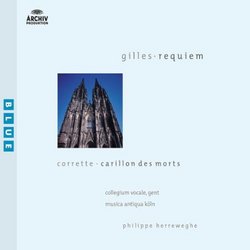Manuscript Version
Leslie Richford | Selsingen, Lower Saxony | 02/24/2008
(4 out of 5 stars)
"Jean Gilles (1668 - 1705): Messe des morts (Requiem)./Michel Corrette (1709 - 1795): Carillon des morts. Performed by: Anne-Marie Rodde, soprano; Jean Nirouet, altus; Martyn Hill, tenor; Ulrich Studer, bass I; Peter Kooy, bass II; Musica Antiqua Köln (dir. Reinhard Goebel); Collegium Vocale Ghent, dir. Philippe Herreweghe. Analogue recording made at the Carmelite Church in Ghent, Belgium, in January 1981. Published on LP in 1981 by Deutsche Grammophon Archiv and rereleased as a remastered CD during the 90s as part of the Collectio Argentea (437 087-2) and again in 2002 as part of the Archiv Blue series (471 722-2). Total playing time: 48'50".
Philippe Herreweghe has recorded Gilles' famous Requiem, the exact date of which is unknown, twice. This first recording was made with Reinhard Goebel's Musica Antiqua for Deutsche Grammophon in 1981 and keeps strictly to the manuscript version, omitting the instrumental additions made in the printed edition by Michel Corrette (1764). The sound is very much what any lover of French baroque vocal music will expect: although masses by French composers were fairly rare at this time, the music is similar to many "grands motets" of the period, with choral and solo passages alternating and the accompanying music consisting mainly of strings and organ. The solo singing parts are allotted almost exclusively to the tenor (Martyn Hill) and the first bass (Ulrich Studer), whose "early music" style voices (light, with little vibrato) blend together and with the good Belgian choir to produce exactly what fans of Charpentier or Campra will be expecting. The other three soloists (soprano, altus, second bass) never have solo passages but participate in occasional duets or trios. The instrumental ensemble (strings 5-2-2-1, plus two flutes, bassoon and organ) is comparatively small, but plays, as one has come to expect from this illustrious troupe, extremely well, only coming into the foreground for Corrette's not-quite-five-minutes-long "Carillon des morts", an instrumental approximation of the ringing of bells at a funeral, this time dominated by the flutes next to the strings. The analogue sound is very good, although I did detect a little background hiss. Less than 49 minutes is, for a rerelease, decidedly stingy and could easily have been complemented by some more French baroque music. On the other hand, a one-to-one re-issues policy guarantees that the purchaser knows exactly what he or she is buying."


 Track Listings (8) - Disc #1
Track Listings (8) - Disc #1